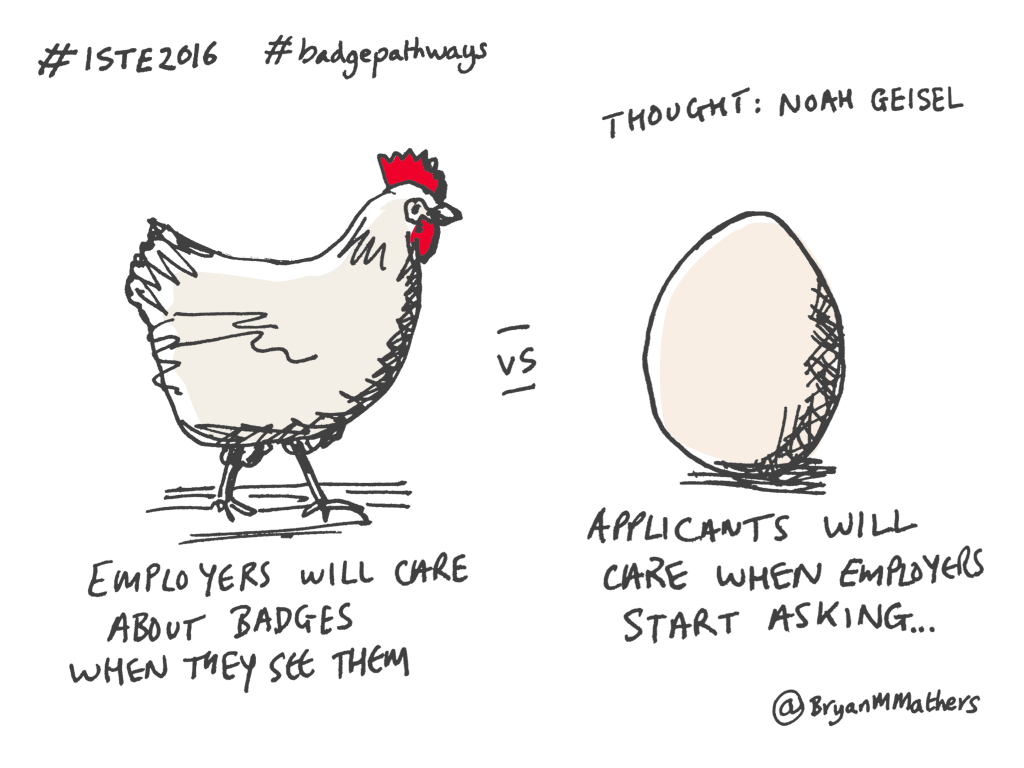The old ‘chicken and egg’ problem about microcredentials kind of misses the point

I’ve been online long enough to know that you should copy to the clipboard text you’re about to post as a comment. That way you don’t lose it. Don Presant’s blog ate my comment on this post, so I’m posting it here.
For context, Brian Mulligan wondered about the burden that employers/institutions face when an application that contains a large number of digital credentials. He wondered whether anyone is working on tools to ease the burden of validating and evaludating the credential.
My response:
Brian, you make good points here – and ones that have been made before. The problem is that both hiring and Higher Education are broken. And by ‘broken’ (as someone has been through the entire system and has a terminal degree) I mean broken.
So we’re now in a situation where people ask a series of questions to candidates before they look at their CV. This is ostensibly for diversity and unconscious bias (which I fully support) but also because CVs do a terrible job at differentiating between candidates.
Given that many microcredentials simply take existing ‘chunky’ credentials such as degrees and diplomas, and break them down into smaller parts, they’re not solving the problem. They’re just allowing universities to make more money by prolonging it.
Instead, we need full-spectrum recognition of individuals. We’ve been at this ever since the start of my career – first with eportfolios, then with badges, then with blockchain, and now with Verifiable Credentials. The issue is that people mistakenly think it’s the credential, badge, or portfolio that needs to be validated. It’s not, it the identity of the individual.
We’re not going to live in a world where everyone has their own domain, sadly, so we need verification systems that allow people to claim and controlled identifiers either publicly or anonymously identify them. If you think about it, you shouldn’t have to apply for jobs, because jobs should come looking for you. I think the systems that are being built now, coupled with some of the AI that Don was talking about, so I think we’re getting closer to solving all of this.
For those dissatisfied with the false dawn of microcredentialing, I’m working on a ‘Reframing Recognition’ email course which I’m hoping to have ready after I get back from holiday. It’ll help people understand why Open Recognition is a much better approach. Come join badges.community to find out why.

I apply for jobs fairly often and I have a fair number of badges. I am not sure what questions you are referring to that are asked before a CV is reviewed. Personally, I believe it is rare for a human to review applications. Mostly, I encounter Applicant Tracking Systems that are designed to filter out applicants. I have not used a single ATS that had a method to enter badges/VCs and even though I list them on my resume, I see no sign that the ATS has in any way recognized them. I assume that most of the time no human is seeing my application at all. Yet I keep submitting them in hopes that some day it might make a difference. I don’t know if that makes me a chicken or an egg.
Perhaps it’s different here in the UK, or maybe in the jobs in sectors I occasionally idly browse? But, either way, we’re in the realms off people using AI to apply for jobs and AI sorting the applications. It’s a race to the bottom.